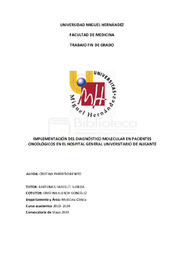Por favor, use este identificador para citar o enlazar este ítem:
https://hdl.handle.net/11000/33899Registro completo de metadatos
| Campo DC | Valor | Lengua/Idioma |
|---|---|---|
| dc.contributor.advisor | Alenda González, Cristina | - |
| dc.contributor.advisor | Massuti, Bartomeu | - |
| dc.contributor.author | Parreño Benito, Cristina | - |
| dc.contributor.other | Departamentos de la UMH::Patología y Cirugía | es_ES |
| dc.date.accessioned | 2024-11-18T12:01:38Z | - |
| dc.date.available | 2024-11-18T12:01:38Z | - |
| dc.date.created | 2024-05-11 | - |
| dc.identifier.uri | https://hdl.handle.net/11000/33899 | - |
| dc.description.abstract | Introducción: El diagnóstico molecular, esta viviendo un gran desarrollo sobretodo en el campo de la Oncología. Recientemente se ha incorporado como herramienta de diagnóstico molecular la Secuenciación de Nueva Generación (NGS). La secuenciación genómica ampliada ha posibilitado ampliar los conocimientos sobre las alteraciones oncogénicas y la utilización de esta información para aplicar tratamientos dirigidos contras dichas alteraciones, individualizando el tratamiento de cada paciente. En una estrategia hacia la medicina de precisión. Objetivos: Los objetivos principales de este trabajo han sido mostrar la creciente necesidad asistencial del uso de nuevas técnicas de diagnostico molecular y lo que supone la introducción de la medicina de precisión de las alteraciones genómicas en la practica clínica diaria en el hospital. Material y métodos: Estudio descriptivo de 491 pacientes oncológicos del Hospital General Universitario de Alicante, en los que se ha realizado técnicas de diagnostico molecular desde 2020 a 2024. Se analizado las indicaciones realizadas en función de tipo de tumor y estadio junto con los resultados de los estudios moleculares y su potencial implicación terapéutica. Resultados: La técnica de diagnóstico molecular más utilizada fue la NGS (76%). Podemos contemplar en los últimos años un incremento del 25,52% en el uso de la PCR y una disminución del 15,77% en la NGS. En el 13% de las muestras analizadas se han documentado alteraciones genómicas que han podido beneficiarse de tratamientos dirigidos. La mayor parte de los casos correspondieron a cáncer de pulmón no microcítico (59,2%). Conclusiones: La medicina de precisión continúa siendo un reto hoy en día, cuya necesidad creciente ha permitido el desarrollo de nuevas técnicas de diagnóstico molecular como la NGS. La implementación del diagnóstico molecular va a permitir facilitar una atención más especializada en el tratamiento del paciente con cáncer. | es_ES |
| dc.description.abstract | Introduction: Molecular diagnostics is undergoing a great development, especially in the field of oncology. Recently, Next Generation Sequencing (NGS) has been incorporated as a molecular diagnostic tool. Extended genomic sequencing has made it possible to increase knowledge of oncogenic alterations and the use of this information to apply treatments directed against these alterations, individualising the treatment of each patient. In a strategy towards precision medicine. Objectives: The main objectives of this work have been to show the growing healthcare need for the use of new molecular diagnostic techniques and what the introduction of precision medicine of genomic alterations entails in daily clinical practice in the hospital. Material and methods: descriptive study of 491 oncology patients at the Hospital General Universitario de Alicante, in whom molecular diagnostic techniques have been performed from 2020 to 2024. We analysed the indications according to tumor type and stage, together with the results of the molecular studies and their potential therapeutic implications. Results: The most commonly used molecular diagnostic technique was NGS (76%). In recent years, there has been an increase of 25.52% in the use of PCR and a decrease of 15.77% in the use of NGS. In 13% of the samples analysed, genomic alterations have been documented that could benefit from targeted treatments. The majority of cases corresponded to non-small-cell lung cancer (59.2%). Conclusions: Precision medicine continues to be a challenge today, the growing need for which has enabled the development of new molecular diagnostic techniques such as NGS. The implementation of molecular diagnostics will facilitate more specialised care in the treatment of cancer patients. | es_ES |
| dc.format | application/pdf | es_ES |
| dc.format.extent | 34 | es_ES |
| dc.language.iso | spa | es_ES |
| dc.publisher | Universidad Miguel Hernández | es_ES |
| dc.rights | info:eu-repo/semantics/openAccess | es_ES |
| dc.rights.uri | http://creativecommons.org/licenses/by-nc-nd/4.0/ | * |
| dc.subject | diagnóstico molecular | es_ES |
| dc.subject | NGS | es_ES |
| dc.subject | medicina de precisión | es_ES |
| dc.subject | tratamiento dirigido | es_ES |
| dc.subject | mutaciones diana | es_ES |
| dc.subject.other | CDU::6 - Ciencias aplicadas::61 - Medicina | es_ES |
| dc.title | Implementación del diagnóstico molecular en pacientes oncológicos en el Hospìtal General Universitario de Alicante | es_ES |
| dc.type | info:eu-repo/semantics/bachelorThesis | es_ES |

Ver/Abrir:
IMPLEMENTACIÓN DEL DIAGNÓSTICO MOLECULAR EN PACIENTES ONCOLÓGICOS EN EL HOSPITAL GENERAL UNIVERSITARIO DE ALICANTE- CRISTINA PARREÑO BENITO.pdf
1,2 MB
Adobe PDF
Compartir:
 La licencia se describe como: Atribución-NonComercial-NoDerivada 4.0 Internacional.
La licencia se describe como: Atribución-NonComercial-NoDerivada 4.0 Internacional.
.png)